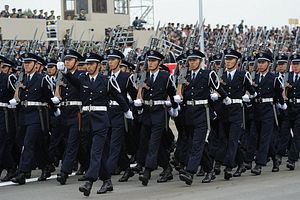Last October, Japanese Prime Minister Kishida Fumio announced that Japan’s National Security Strategy, the National Defense Program Guidelines, and the Mid-term Defense Program would be updated simultaneously and revised by the end of 2022. Simultaneous revision makes sense, as the three documents are closely interrelated: the National Security Strategy deals with Japan’s foreign and defense policy for the next decade, the National Defense Program Guidelines deal with the role of the Self-Defense Forces (SDF) and their development, and the Mid-term Defense Program covers defense procurement.
On October 18 of this year, the ruling Liberal Democratic Party (LDP) and its coalition partner Komeito held their first council meeting to discuss revisions. Even though Komeito did not have a strong showing in the last election – they lost one seat in comparison to the LDP, which picked up six seats – the LDP is still giving Komeito significant consideration on defense issues.
This consideration is expressed through parity of membership in the council, as well as in the existence of the council itself. The council is comprised of five members from the LDP and Komeito, even though the LDP and affiliated independents hold 119 seats in the House of Councillors, compared to Komeito’s 27 (out of 248 total), and 260 seats in the House of Representatives to Komeito’s 32 (out of 465 total). The LDP also would have preferred discussions be held in working-level meetings, but it was Komeito that insisted on higher-level talks.
Bowing to Komeito’s wishes, the council was created, including many senior figures from the LDP – however, their presence is largely to lend credibility to the recommendations that come out of the work done by younger, mid-career legislators working on the defense issues. As a clear illustration of this point, the first 10-person meeting with the senior leaders of the LDP and Komeito lasted only about 15 minutes, and no concrete issues were discussed.
Many topics are expected to be covered by the council, including counterstrike capabilities for the purpose of self-defense, how to pay for increased defense spending, and cyber and economic security. Counterstrike capabilities are likely to be the most divisive of the issues between the LDP and Komeito. Komeito would like to limit the conditions under which using force is permissible (and not considered an illegal preemptive strike) by restricting the definition of an enemy “beginning an attack.” They also want to limit the targets of counterstrike capabilities to a minimum.
The LDP, on the other hand, believes that laying out clear criteria for when an enemy is “beginning an attack” would undermine deterrence by giving the enemy information about when Japan would begin a counterstrike. It is a difficult issue because of real challenges in identifying when an enemy has put an attack in motion. They also want the scope of potential targets to include “command and control functions,” such as headquarters.
In addition to the question of what range of counterstrike capabilities to acquire and approve, there is also the question of how to pay for increased defense spending. Some in the Japanese government believe that focusing on 2027 as key turning point when, they presume, the balance of power in East Asia will shift in China’s favor will rally public support for increased defense spending. 2027 is also given special attention is because it is the next time the Communist Party gathers together, the next major milestone in China’s military modernization plan, and the centennial of the People’s Liberation Army.
For the first time, there might even be public support in Japan for increased defense spending, as Russia’s invasion of Ukraine shocked the pacifist nation. In an NHK opinion poll from last month, 55 percent of respondents supported increased defense spending, while 29 percent opposed. Of those who supported increased military spending, 61 percent believe Japan should pay for it with public spending cuts. If spending cuts are not enough to fund the defense build-up, the LDP is considering increasing the income or corporate tax – which may be fiercely opposed.
The LDP has been willing to make concessions to the Komeito on the form of how defense issues are discussed, but an interesting dynamic to keep an eye on will be how much the LDP will concede to the Komeito in discussions on the substance of defense issues.

































